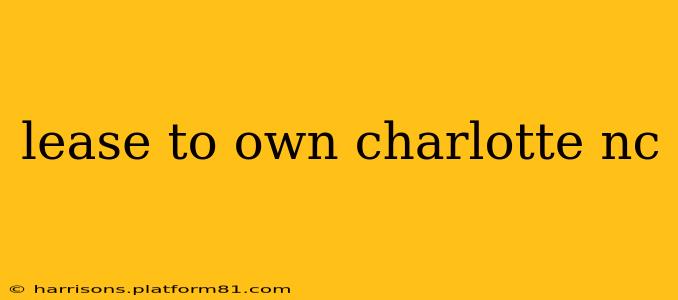Charlotte, North Carolina, a vibrant city brimming with opportunity, is also a competitive real estate market. For many aspiring homeowners, the traditional route of securing a mortgage can feel daunting. This is where lease-to-own (LTO) agreements come into play, offering a potential pathway to homeownership. This guide delves into the intricacies of lease-to-own homes in Charlotte, NC, addressing common questions and concerns.
What is a Lease-to-Own Agreement?
A lease-to-own agreement, also known as a rent-to-own agreement, is a contract where a tenant leases a property with the option to purchase it at a predetermined price within a specific timeframe. It combines elements of renting and buying, allowing prospective buyers to build equity while simultaneously living in the home. This approach can be particularly beneficial for individuals with less-than-perfect credit or those who need time to improve their financial standing before securing a traditional mortgage.
How Does a Lease-to-Own Agreement Work in Charlotte?
The specifics of a lease-to-own agreement can vary, but generally, it involves these key components:
- Lease Period: A set timeframe during which the tenant (potential buyer) leases the property.
- Option Fee: A non-refundable fee paid upfront to secure the right to purchase the home. This fee often contributes towards the eventual purchase price.
- Purchase Price: The price agreed upon for buying the home at the end of the lease period. This price is typically set at the outset of the agreement.
- Rent: The monthly rental payment, which may include an additional amount that applies towards the eventual purchase price. This is often called a "rent credit" or "equity builder."
It's crucial to remember that not all of the rent paid goes towards the purchase price. A significant portion still covers the landlord's costs of property maintenance and taxes. Carefully review the agreement to understand the exact breakdown.
Are There Specific Lease-to-Own Properties in Charlotte?
While there isn't a dedicated "lease-to-own" market section on major real estate listings, finding suitable properties requires proactive searching. You can find suitable properties by:
- Working with a Real Estate Agent: A knowledgeable agent specializing in Charlotte real estate can help you identify suitable properties and navigate the complexities of lease-to-own agreements.
- Networking: Reach out to friends, family, and colleagues who might know of opportunities. Word-of-mouth can often uncover properties not widely advertised.
- Online Search: Use relevant keywords such as "lease to own Charlotte NC," "rent to own Charlotte," or "option to buy Charlotte NC" in your online searches. However, be cautious and thoroughly vet any opportunities found online.
What are the Pros and Cons of Lease to Own in Charlotte?
Pros:
- Opportunity for Homeownership: Provides a pathway to homeownership for those who may not qualify for a traditional mortgage.
- Time to Improve Credit: Allows time to improve credit scores and financial stability.
- Equity Building: A portion of your monthly payments contributes toward the eventual purchase price.
- Familiarization with the Property: Provides time to live in the home and understand its upkeep and maintenance needs.
Cons:
- Higher Costs: Lease-to-own arrangements often result in higher overall costs compared to a direct purchase.
- Risk of Loss: If you cannot complete the purchase at the end of the lease, you lose the option fee and any rent credits.
- Complex Legal Agreements: It is essential to have the agreement carefully reviewed by a legal professional to protect your interests.
- Market Fluctuations: Property values could decrease during the lease period, impacting the final purchase price.
What are the Potential Risks of Lease-to-Own Agreements?
The most significant risks include:
- Loss of Investment: Failure to fulfill the purchase option results in the loss of the option fee and any accumulated rent credits.
- Unfavorable Terms: Unfair or overly complex lease terms can put the buyer at a disadvantage.
- Hidden Costs: Unexpected repairs or maintenance responsibilities can significantly increase costs.
- Lack of Legal Protection: Without careful legal review, the buyer may lack adequate legal recourse if disputes arise.
It's crucial to approach lease-to-own arrangements with caution and thorough due diligence.
How Can I Find a Reputable Landlord or Seller?
Finding a reputable landlord is paramount. Thoroughly research potential landlords, check references, and carefully review the contract. Consult with a real estate attorney to ensure the contract protects your interests.
What are the Legal Aspects of Lease-to-Own Agreements in North Carolina?
North Carolina law governs lease-to-own agreements. It's essential to consult with a real estate attorney to understand your rights and responsibilities under the law. The attorney can help you negotiate favorable terms and avoid potential legal pitfalls. This is particularly important to ensure the contract is clear, legally sound, and protects your interests.
By understanding the nuances of lease-to-own agreements and exercising due diligence, aspiring homeowners in Charlotte can explore this potential pathway to achieving their homeownership dreams. Remember to seek professional advice from real estate agents and legal counsel throughout the process.
